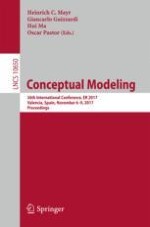2017 | OriginalPaper | Buchkapitel
What Happens to Intentional Concepts in Requirements Engineering if Intentional States Cannot Be Known?
verfasst von : Ivan J. Jureta
Erschienen in: Conceptual Modeling
Aktivieren Sie unsere intelligente Suche, um passende Fachinhalte oder Patente zu finden.
Wählen Sie Textabschnitte aus um mit Künstlicher Intelligenz passenden Patente zu finden. powered by
Markieren Sie Textabschnitte, um KI-gestützt weitere passende Inhalte zu finden. powered by
